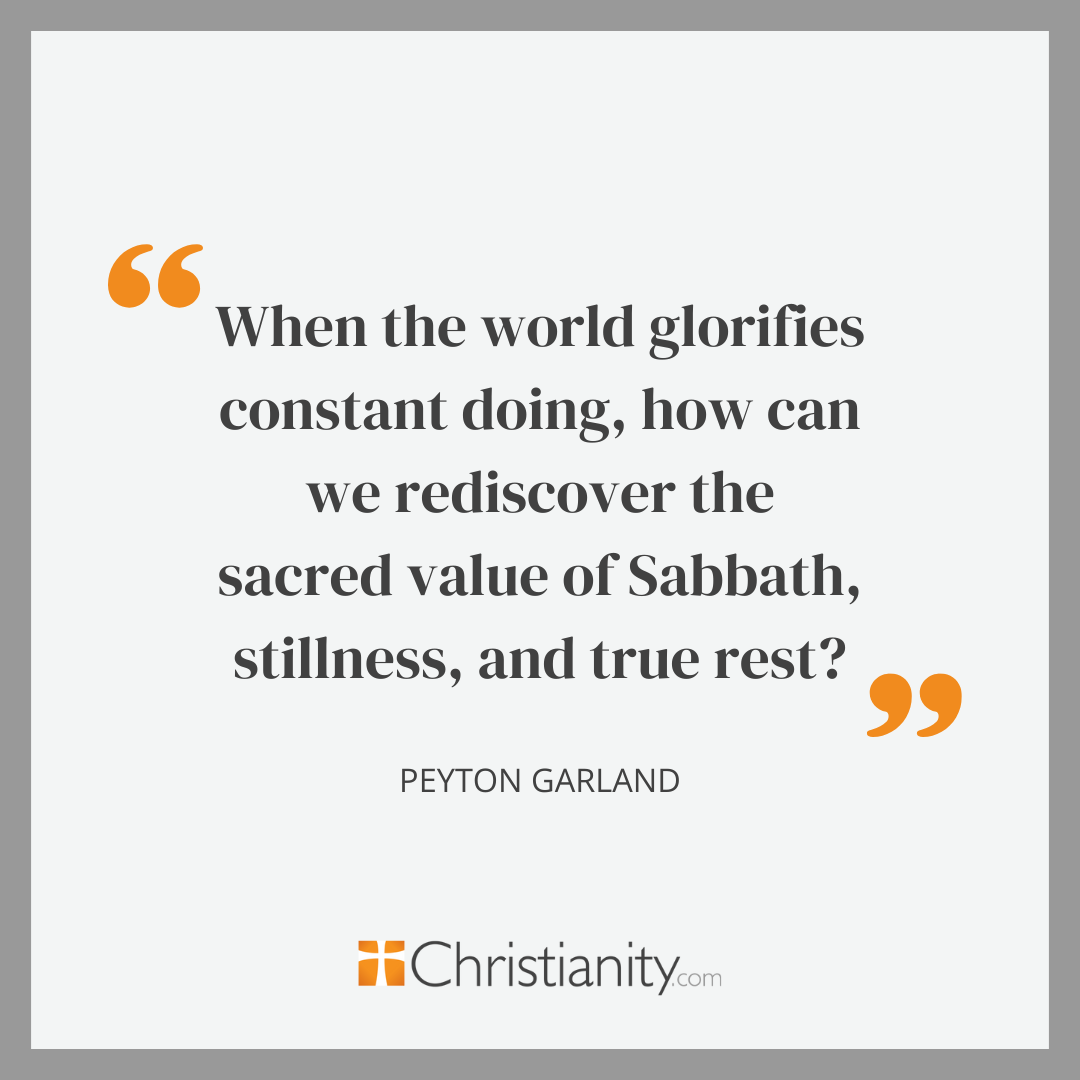Just today, I submitted a book proposal to an agent and received an instant reply that explained she isn’t reading new pitches until September. At the bottom of her email, she included a quote by John Lubbock: “Rest is not idleness, and to lie sometimes on the grass under trees on a summer’s day, listening to the murmur of the water, or watching the clouds float across the sky, is by no means a waste of time.”
Today’s culture, especially in America, doesn’t practice rest, let alone understand its meaning. In fact, many see rest as a resistance to the normalized “grind.” The grind is a dog-eat-dog atmosphere where men and women clamor for those big career goals or social statuses, but sacrifice their sanity and relationships along the way.
When I was a teen, we often referred to this as “freaking out,” when adults (mostly moms and school teachers) subliminally highlighted stress as a sign of success. Nowadays, many say it’s “crashing out.” Instead of elevating the idea of stress, people are beginning to realize that the end result is burnout, which is dangerous for our mental, physical, emotional, and even spiritual health.
When the world glorifies constant doing, how can we rediscover the sacred value of Sabbath, stillness, and true rest?
This question leaves the believer no choice but to return to the gift of the Sabbath. Once we understand what the Sabbath is and how to implement it in today’s hectic culture, we won’t be consumed by exhaustion. Instead, we will accept our limitations, reconcile our relationship with competition, and find purpose in God’s gift of rest.

Understanding the Sabbath
The first time we see the term “Sabbath” in the Bible is in Exodus 16:23 (NLT): “He told them, ‘This is what the Lord commanded: Tomorrow will be a day of complete rest, a holy Sabbath day set apart for the Lord. So bake or boil as much as you want today, and set aside what is left for tomorrow.’”
In this verse, God makes it clear that the Israelites aren’t to work on the Sabbath, a holy, reverential day to focus on His goodness. At this time in Scripture, the Israelites had been recently freed from bondage in Egypt, so I can’t help but wonder if the Sabbath was less of a rigid command and moreso an opportunity for the people to, for once in their lives, not work. No longer slaves, the Israelites were free to relax, enjoy the day, and worship their God. God was handing them the gift of time to truly spend the day doing what was healing and wholesome for their bodies, minds, and souls.
In short, God was establishing rest as reverence, holiness, and freedom.
Accepting Our Limitations
I find it funny that God’s first command regarding the Sabbath is centered on food, but considering today’s culture, food is an undeniable example of why humans won’t accept limitations regarding time. We have too many places to go, too many things to do, and too many people to talk with to honor the process of preparing a meal. Instead, we opt for cramming our schedules with to-dos and, in turn, feed ourselves and our families whatever is easiest (and cheapest). Not only does fast food harm our physical bodies, but the false idea that we aren’t limited by time robs us of just that—quality time at home preparing food with loved ones.
Of course, there are emergencies and days when you are truly too exhausted to prepare a grandiose dinner. I’ll be the first to admit that I’ll grab a pizza or Chick-fil-A if it’s been a rough day. However, if you can’t recall the last time you stayed at home for the evening and cooked food for yourself and your family, perhaps it’s time to look at your calendar and see which to-dos are keeping you from slower, healthier evenings with family, friends, yourself, and God.
Reconciling Our Relationship with Competition
We’ve convinced ourselves that happiness is found in surrendering our time and talents to the algorithm, a fickle, ever-changing series of internet codes that, perspectively, means nothing. But when we don’t keep a healthy relationship with the algorithm and social media, we are engulfed in the rat race of life, which God did not invent, nor ask us to participate in. Ironically enough, rat races only grant the winner a nibble of cheese—not their freedom from being controlled by the maze.
When life is about gaining more followers, keeping up with the neighbors, or trying to consistently outdo yourself, you’ve created a goal that has no ending. It’s an impossible feat, so, essentially, you are the person Paul references as “beating the air” (1 Corinthians 9:26). You’re swatting and swiping and sweating to make every minute of your life “mean something,” as defined by a shifting algorithm affirmed by strangers, yet you’re not sure why you constantly feel alone, unfulfilled, and exhausted.
Perhaps you’ve lived this algorithm life for so long that you don’t realize what you’re missing. It’s easy to have tunnel vision when you think your life is a competition, but take a few moments to consider what you’ll truly gain from all these manmade accolades you’re pursuing. Furthermore, consider if reaching these goals will only leave you feeling that there’s a new one you must chase.
Exhausting, right?
Finding Purpose in God’s Gift of Rest
I often think of what Jesus said in Mark 2:27 (NLT): “...‘The Sabbath was made to meet the needs of people, and not people to meet the requirements of the Sabbath…’”
We see rest as a painful pause that will ruin us, but if God made the Sabbath for us, rather than us being slaves to the rules of the Sabbath, perhaps this is God’s way of saying, “You’re surviving off a nibble of cheese, but I want to free you from the entire game, where you aren’t abused for other people’s amusement or enslaved to the lies that you only matter if you’ve reached the top. I want you to be free today, and every day, to know me and experience the joy of my rest.”
Friend, perhaps it’s time to take a few minutes to not only look at your calendar but to see what it’s saying about how you view yourself, your family, and your relationship with God. Ask yourself a few yes/no questions to guide your thoughts:
1. In the past week, have I spent an evening at home with my family, cooking a healthy meal and hosting encouraging conversation around the dinner table?
2. Am I able to truly slow my mind down each night, or is it swimming with anxious thoughts about all of tomorrow’s to-dos?
3. In the past month, have I honored at least one or two Sabbath days by worshipping God, attending church, spending quality time with family and/or friends, relaxing outside, or resting (reading a book [for fun], spending time in the garden, taking a bubble bath, etc.)?
4. When my phone shows my weekly screentime report, what is it revealing about my relationship with competition—my need to constantly be seen, heard, and feel as though I’m excelling?
5. When I read Mark 2:27, Jesus is gifting the Sabbath to man, so how can I not only see but honor the Sabbath as a gift rather than a command?
After you’ve answered these questions, or whichever questions the Holy Spirit stirs in your mind, consider the action steps you can take to shift your routine from one of striving to one of resting in God’s provision and the eternal purpose He has already instilled inside you.
May your crash-outs be few and your days of rest be plenty, my friend!
Related Resource: Burnout, Rest, and Stewarding Your Yes
Some of us have been going and going, filling up our schedules, and leaning into business, only to feel like we have lost our purpose and connection with Christ. In my good friend, Tara Sun's, new book, she talks about how we can cultivate rhythms of rest, resetting with God, and organizing our commitments to honor God and not end up in burnout! I pray this episode blesses you as much as her new book, Overbooked and Overwhelmed, has blessed me! Like what you hear? Subscribe to Bought + Beloved with Kirby Kelly on Apple or Spotify so you never miss an episode!
Photo Credit: ©Unsplash/Afif Ramdhasuma





.jpg)